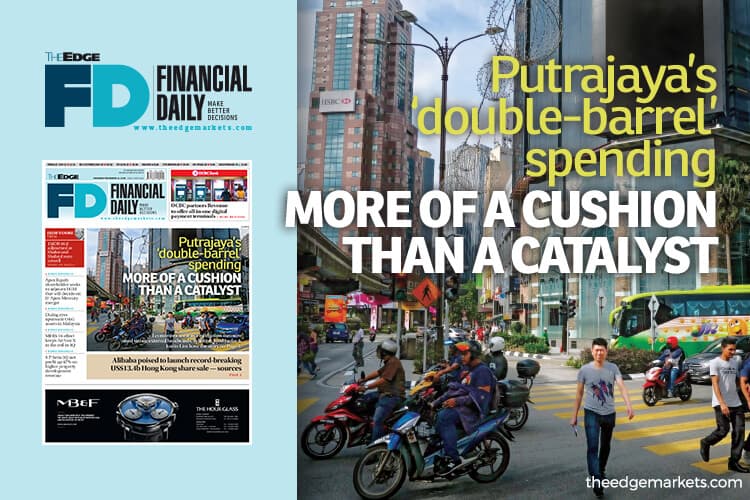
This article first appeared in The Edge Financial Daily on November 14, 2019
KUALA LUMPUR: Finance Minister Lim Guan Eng said yesterday that the government’s current development expenditure will spill over to next year and provide a good support for the country’s growth at a time when global economies are projected to slow.
The government has projected Malaysia’s real gross domestic product (GDP) to grow by 4.8% in 2020, slightly higher than the estimated 4.7% for 2019.
This is because it is highly unlikely for all of the development expenditure meant for this year to be spent in the same year, Guan Eng said, so whatever not spent will be rolled over to 2020, giving the economy a double-barrel effect, described to mean two-fold, when the previous year’s allocated expenditure is spent together with the current year’s allocation.
The minister said this in response to reporters’ question on the outlook of the economy yesterday, after delivering his keynote speech at the 60th Pan Asian e-Commerce Alliance luncheon.
“What we will see is that for the 2019 development expenditure, some can only be spent in 2020 —giving a double-barrel effect. So we are more confident of [seeing] economic growth as two years of development expenditure will be spent in one,” Guan Eng said.
However, rather than a catalyst for growth, the double-barrel spending will more likely be a mitigation or cushion to potential downside risks amid increasing signs of a global slowdown, economists said.
“Development expenditure not spent this year will certainly add to the overall government spending for next year. Together with the higher budgeted spending for next year, the delayed or postponed portion of government investment adds to the so-called ‘double barrel’ effect,” Sunway University Business School economics professor Dr Yeah Kim Leng told The Edge Financial Daily.
By and large, Yeah said the double-barrel spending will be “more [about] offsetting the potential slow-down risk in the global economy, given the high level of uncertainty in the global outlook for next year rising from the unconcluded trade talks between the US and China.”
Socio-Economic Research Centre executive director Lee Heng Gui concurred. The private sector, he said, will continue to be the primary driver of economic growth.
Guan Eng told reporters the spillover will happen because the government is pushing for more projects to be done through open tender, which may take more time for new projects to be rolled out.
While he did not specify how much of the budgeted RM53.7 billion development expenditure this year will be spent next year instead, the government has budgeted RM56 billion for development expenditure next year. Of the 2020 allocation, RM53.2 billion is for 4,744 ongoing projects, while RM2.8 billion is for 722 new projects.
“Given the relative inexperience of the new administration when it took over the government last year, a case can be made that its spending rate and efficiency will pick up as it moves up the learning curve,” Yeah said.
Stimulus to be implemented if economic situation turns more sluggish
On Malaysia’s economic growth for the third quarter of 2019, which is scheduled to be released by Bank Negara Malaysia tomorrow, Guan Eng declined to comment except to say that the country is expected to pose sustainable growth.
While he noted rating agencies such as Moody’s have revised down their global sovereign outlook next year to “negative” from “stable”, he believes Malaysia’s rating remains stable.
“The International Monetary Fund has downgraded its global growth forecasts to 3%. Many countries too have lowered their growth forecasts. If we do a comparison, perhaps we are stronger but in terms of absolute numbers there may be an effect. Nevertheless, I believe Malaysia remains stable with its growth,” Guan Eng added.
Moody’s cut its global sovereign outlook for 2020 to “negative” from “stable” on Monday, saying disruptive and unpredictable world politics would slow growth and increase the risk of economic or financial shocks. It now expects growth in the G20 group of top world economies to stay around 2.6% next year, after 3% in 2018.
On whether the government has a stimulus package if the economy takes a turn for the worst, Guan Eng said it will be implemented if the economic situation becomes more sluggish. Size-wise, he said the government has fiscal space but it will depend on the situation.
He also pointed out that the government has already provided various incentives in the recently-announced Budget 2020 to help stimulate the economy, like the e-wallet initiative where it offers a one-time RM30 spending allowance for qualified Malaysians.
Budget 2020 allocated up to RM450 million to Khazanah Nasional Bhd to implement this digital stimulus, which will benefit up to 15 million Malaysians, he reiterated.
Earlier in his speech, Guan Eng said the government is helping to digitalise and future-proof the economy by investing heavily in digital infrastructure, reforming the broadband market, and encouraging small and large businesses to make the leap towards Industry 4.0 (IR4.0).
On that note, he said the government will be providing RM20.7 billion worth of cash and non-cash incentives for over five years, starting next year, to assist Malaysian companies’ transition to IR4.0. “After all, either you digitalise, or you will not survive. This is the reality that we have to face,” he added.